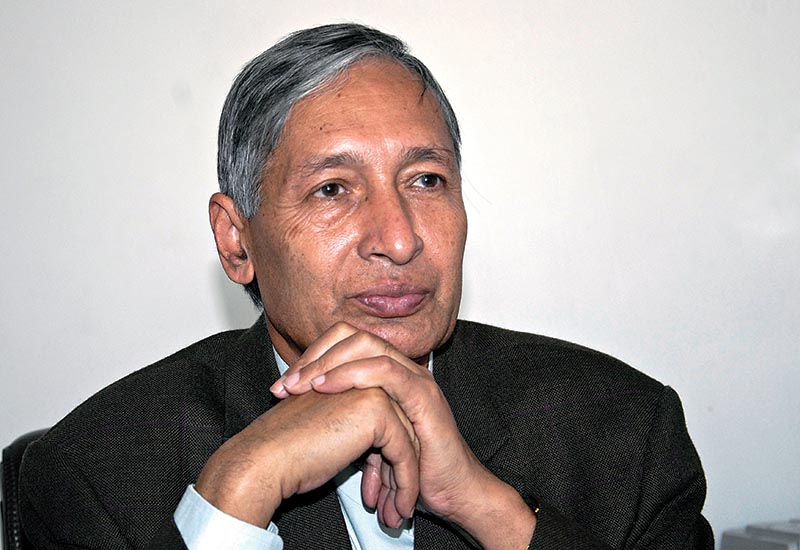Imports should promote production, says finance minister
Kathmandu, June 7
Criticising the rampant import ‘that is responsible for excessive consumerism’, Finance Minister Yubaraj Khatiwada has said that the country’s import should promote production, lead to value addition and develop the value chain in the country’s economy.
Speaking during a post-budget discussion here today, Finance Minister Khatiwada said that the strategy of big industries relying on import-based raw materials instead of creating favourable ground for ancillary industries and backward linkages could be risky if the country faces external shocks that could result in decline in remittances, among other factors. “This is why the budget for fiscal 2018-19 has laid emphasis on resilient, self-reliant and interdependent economy,” said the finance minister, adding, “We are aiming to increase the gross capital formation as the requirement of capital investment is huge to achieve economic prosperity.”
To encourage the private sector to utilise their savings (profits) in reinvestment and develop the capital market by bringing in real sector companies in the stock market, the government has offered tax incentives. The federal budget 2018-19 has waived the tax on dividend for the productive sector industries and tourism industries if they reinvest in their own industries. Similarly, private limited companies with paid-up capital of Rs 500 million will get 10 per cent income tax exemption for next three years, as per the provision of budget unveiled by Finance Minister Khatiwada on May 29.
Similarly, the government has encouraged foreign direct investment (FDI) only in those sectors that can create maximum value addition in the economy and discouraged FDI in non-tradable sector, according to finance minister.
On a positive note, Finance Minister Khatiwada said that the government is in favour of protecting consumers and creating a competitive environment among the service providers and industries. “The government has taken the issues related to cartels by traders and service providers to generate maximum profit very seriously,” the finance minister said.
He also said that the government will not protect the industries that cannot improve its efficiency within a certain period of time. “The provisions introduced for protection of some industries are sunset clause and we are aware that the economy cannot be efficient by protecting the industries than can never be competitive,” Khatiwada asserted.
Finance Minister Khatiwada further said that the government will put its entire efforts to execute the budget and the required guidelines to implement the budget will be prepared within this fiscal and the government will also table the Amendment Bill and fresh bills related to industry, commerce, investment, energy and finance in the budget session of the Parliament.
Finance minister also underpinned that the government is willing to join hands with the private sector for execution of budget and to promote investment, create jobs and boost productivity in the country. “The government is also flexible towards the concerns raised by the private sector for the promotion of transparent, fair, objective and ethical business practice in the country.”
In the programme, Revenue Secretary Shishir Kumar Dhungana said that the government has tightened the customs tariff only in the ‘grey area’ where there is an ongoing debate on categorisation of certain products as ‘finished goods’ or ‘raw materials’. “We have to lower the customs tariff of intermediate goods compared to the finished products and the government is open to hold talks with the private sector to promote production sector,” Dhungana said.
Confederation of Nepalese Industries (CNI) President Hari Bhakta Sharma opined that the government should expand the tax net instead of increasing tax rates and also urged the government to collaborate with the private sector to bring down the cost of doing business in the country.
The discussion today was jointly organised by the Society of Economic Journalists-Nepal and CNI.






